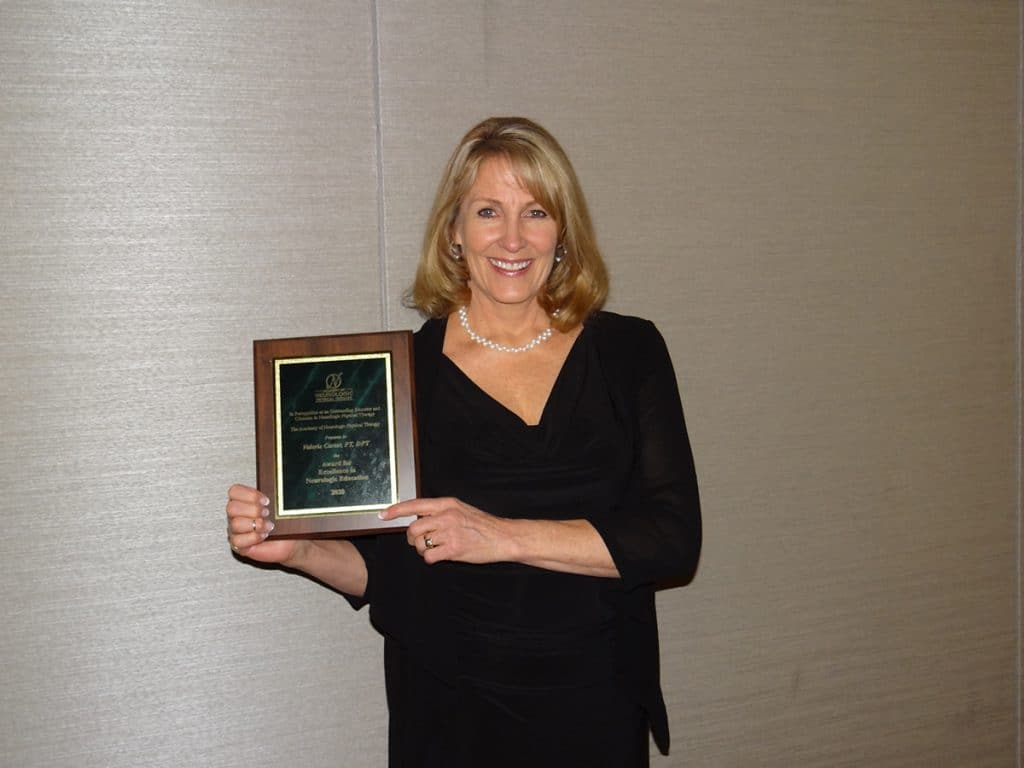Valerie Carter had just finished her bachelor’s degree when she got a phone call—was she interested in trying out for the U.S. diving team?
The Lumberjack, who’d just spent three years on NAU’s fledgling diving team, didn’t even think about her answer.
“When that invitation came along, I was already admitted into physical therapy school and I said, ‘I can’t wait for that,’” the four-time alumna said. “I was so excited. I’ve been wanting to do this since I was in seventh grade, and I’m going to do it.”
So Carter opted for blue and gold over red, white and blue. She went to PT school, became a clinician, then got two advanced degrees in physical therapy. She’s never looked back.
That choice, which led to a 30-year career in clinical work, research and education, was recognized Friday by the Academy of Neurologic Physical Therapy, which presented Carter with its Excellence in Neurologic Education Award. The academy, which is one of the fastest-growing sections of the American Physical Therapy Association, gives this award annually to educators who demonstrate excellence in education, including in college classes, clinics and continuing education.
It’s quite an honor for the industry veteran.
“The people who have won this award—I just think, ‘wow, there’s no way I’m in that category of educator,” Carter said with a laugh.
Carter, a professor of physical therapy at NAU who owns Carter Rehab with her husband, spends several weekends a year teaching continuing education units, or CEUs. Licensed physical therapists are required to attend a certain number of CEUs a year to keep their knowledge and techniques current. They’re a great way to connect the newest research with hands-on patient work, and Carter is uniquely qualified for such a role. Because she is doing research at the same time as she does clinical work, she knows what clinicians need and how to translate research into doable exercise programs.
“I’ve just been doing it for so long,” she said. “I love teaching people who’ve had the experience to be out in the world who just know what I’m talking about.”
Carter has been teaching at NAU for more than 20 years while also researching methods to identify and mitigate the risk of falling among older patients and people with neurological disorders like Parkinson’s disease, stroke and multiple sclerosis. At NAU, she pioneered two pro bono clinics that connect physical therapy students who need clinic hours with members of the community who need physical therapy options. It’s made her a popular professor too.
“Dr. Val Carter is always looking for ways in which the NAU PT students can gain unique experiences that set our program apart from others,” said Lynda Ransdell, dean of the College of Health and Human Sciences. “As a result of her efforts, our students gain practical, community-focused and interprofessional experience. She champions the pro bono community clinic and overseas travel so our students can experience PT and health care in other countries.”
Patricia Pohl, a professor and chair of the Department of Physical Therapy and Athletic Training, nominated Carter for the award. She highlighted Carter’s research and her focus on pro bono work.
“Although I have had the opportunity to work with many faculty members who have similar responsibilities to her, Dr. Carter’s contributions to neurologic education are striking,” Pohl wrote in her nominating letter.
Carter’s research also is breaking new ground. She focuses on Parkinson’s disease, a degenerative neurological disorder that causes a part of the brain to die. That part of the brain affects movement, so as the disease progresses, people with Parkinson’s find themselves unable to reflexively make big or strong movements. That leads atrophying of muscles, greater risk of falling and less confidence in their bodies.
Physical therapists have long known that exercise is beneficial for persons with Parkinson’s. What scientists are now learning, Carter said, is that a sustained and curated exercise plan can actually slow the progression of the disease. The exercises physical therapists prescribe can facilitate the persons with Parkinson to be stronger, have better balance, think and move more normally and improve the resilience and health of their brain.
“Research from all over the world is showing if you exercise intensely, you’re actually slowing the disease progression,” she said. “Isn’t that exciting? It’s not just that they’re moving a little better; we’re actually slowing the progression of the disease and improving the quality of our patient’s lives.”
Carter has witnessed the effect of groundbreaking PT care firsthand. More than 30 years ago, her mother was diagnosed with the illness. Carter, not quite a therapist yet, promised her mother she’d never get to Stage 5—the last, most painful stage that often leaves people bedridden. For 30 years, Carter applied what she learned with her mother. For 29 years, her mother lived a healthy, full life with Parkinson’s. She died in 2017 at age 83 without getting to Stage 5.
However, her mother’s final year taught Carter that more research was needed about maintaining cognition as the disease progressed. The basal ganglia, the parts of the brain that Parkinson’s affects, also affect cognitive functions like attention, memory, sequencing and executive function. Carter is designing tests that ask patients to do two tasks at a time, such as walking 10 steps, turning and walking back while reciting the days of the week backward.
“It’s a strength issue, it’s a quickness issue, it’s a power issue,” she said. “We want them to have enough confidence to be able to produce the movement that’s going to keep them from falling.”
Learn more about Carter’s work with the pro bono clinic and a recent study abroad to Jamaica with five doctoral students who provided rehab for underserved patients.

(928) 523-8737 | heidi.toth@nau.edu



